|
|
|
Sort Order |
|
|
|
Items / Page
|
|
|
|
|
|
|
| Srl | Item |
| 1 |
ID:
074151
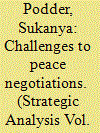

|
|
|
| 2 |
ID:
074283
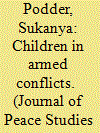

|
|
|
| 3 |
ID:
113105
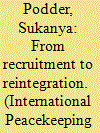

|
|
|
|
|
| Publication |
2012.
|
| Summary/Abstract |
In disarmament, demobilization and reintegration (DDR) programmes, return to home communities is a normative given, around which reinsertion and reintegration support is planned. Yet such an approach is oblivious of pre-war social dynamics of rebel recruitment and civilian experiences of rebel abuse and coercion. These manifest as important sources of social tension between communities and combatants in the post-war period and complicate reintegration. This research shows that the 'recruitment-reintegration' nexus offers a key variable for explaining tensions between civilian communities and ex-combatants in post-conflict Liberia, and could be leveraged in future efforts to improve DDR programmes.
|
|
|
|
|
|
|
|
|
|
|
|
|
|
|
|
| 4 |
ID:
116336
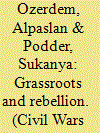

|
|
|
|
|
| Publication |
2012.
|
| Summary/Abstract |
An important aspect in the resolution of civil conflict pertains to the political transition of rebel groups, dissipation of their command structures and reintegration of former combatants. In this paper, we draw on empirical data collected in select communities of Lanao, Cotabato and Maguindanao provinces of Mindanao, Philippines during June 2010 to explore future trends in civilian support for the main separatist rebel outfit in Mindanao - the Moro Islamic Liberation Front (MILF). We test variance in the existence of recruitment pools among the two main Muslim ethnic groups - the Maranao and the Maguindanao. Our findings suggest that recruitment into MILF is not simply about religion or ideology, this is a simplification of its underlying support base. Several factors such as geographic location, especially proximity to Armed Forces of the Philippines camps, and conflict-related impacts of displacement, together with disparity in governance delivery levels, have resulted in divergence in levels of support for the Bangsamoro struggle between the two main ethnic groups. These variables will have an impact on the future existence of the MILF as a rebel movement.
|
|
|
|
|
|
|
|
|
|
|
|
|
|
|
|
| 5 |
ID:
099854
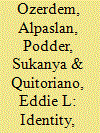

|
|
|
|
|
| Publication |
2010.
|
| Summary/Abstract |
The cessation of the governmental offensive to eliminate key figures of the separatist Moro Islamic Liberation Front (MILF) in 2009 imparted fresh impetus to the peace process in Mindanao, Philippines. Recent clashes have resulted in large-scale and ongoing displacement. This stalemate, together with the end of Gloria Macapagal Arroyo's Presidential term, has revived concerns about the future dynamics of the Bangsamoro struggle. An important dimension in this is the 'voluntary' nature of the participation of children and young people in the ranks of the MILF, sanctioned and often encouraged by their families and community. This presents an interesting contrast to the predominant literature on child soldiering that seems overly aligned with the coercive recruitment and related trauma-healing axis. In this article we examine the role of identity, ideology, the family and community in this presumed voluntary participation of children and youth in the MILF, in order to refine the linkage between recruitment experience of children and youth and their reintegration outcomes, and prescribe more appropriate reintegration interventions for youth in scenarios of participation sanctioned by family and community.
|
|
|
|
|
|
|
|
|
|
|
|
|
|
|
|
| 6 |
ID:
191861
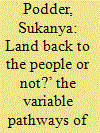

|
|
|
|
|
| Summary/Abstract |
Drawing on empirical research from Pujehun and Port Loko districts in Sierra Leone, this article explains the variable pathways of civic activism mobilised by environmental advocacy, and legal empowerment organisations, in response to two prominent land grabs. By grounding the analysis within the ontology of place, this study examines the dynamic interplay between national politics, global corporate interests, transnational advocacy, and civic agency in each place. The article finds that although the balance of power between these actors matters, the nature of corporate interests involved can be significant in determining the exact trajectory of civic mobilisation, and ultimately its success.
|
|
|
|
|
|
|
|
|
|
|
|
|
|
|
|
| 7 |
ID:
119247
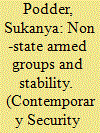

|
|
|
|
|
| Publication |
2013.
|
| Summary/Abstract |
Events such as the Arab Spring in Tunisia, Egypt, Libya, and Syria have created an urgent need for the international community to engage with a range of armed groups during and after conflict. This engagement extends beyond humanitarian, conflict resolution and counter-terrorism ends to issues of democratization and political transition of such groups in legitimate, stable, and inclusive governments. This article underlines the need to reconsider post-counter-terrorism engagement styles, which frame non-state armed groups (NSAGs) exclusively as spoilers, and stresses opportunities for state-building partnership that certain NSAGs offer. Towards this end, this article emphasizes the importance of distinguishing between different types of NSAGs, based on their sources of legitimacy, resources, reliability, and partnering potential. It concludes with four entry points that promise a strong basis for incorporating 'legitimacy, inclusion, and resource' considerations into the planning and implementation of future state-building efforts.
|
|
|
|
|
|
|
|
|
|
|
|
|
|
|
|
| 8 |
ID:
079614
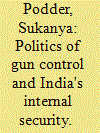

|
|
|
| 9 |
ID:
181418
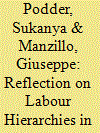

|
|
|
|
|
| Summary/Abstract |
Why do the attitudes of United Nations military peacekeepers towards peacekeeping shift after their deployment from positive to negative ones and how do labour hierarchies influence this shift? Using surveys with military peacekeepers gathered within a professional military education (PME) context, we conducted an exploratory pilot study about individual attitudes towards UN peacekeeping operations (UNPKOs) after deployment. We found that a majority changed their opinion about UNPKOs as an effective tool for peacebuilding from positive to negative. Specifically, we found that 82% of troops from the Global South changed their perceptions from positive to negative after deployment; while 59% of Global North peacekeepers did not change their perceptions. This shift was on account of enduring command and control challenges, problems with analysing intelligence, and, the growing demands of robustness to protect civilians, which increasingly place peacekeepers from the Global South at the risk of armed attacks and under scrutiny for underperformance. Findings urge scholars and policy-makers to address the problem of labour hierarchies in the political economy of peacekeeping as a significant source of misalignment between the perceptions and experiences of troops from the Global South and the growing expectations of performance from them.
|
|
|
|
|
|
|
|
|
|
|
|
|
|
|
|
| 10 |
ID:
080612
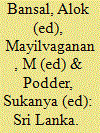

|
|
|
|
|
| Publication |
New Delhi, Manas Publications, 2007.
|
| Description |
247p.
|
| Standard Number |
8170493404
|
|
|
|
|
|
|
|
|
|
|
|
Copies: C:1/I:0,R:0,Q:0
Circulation
| Accession# | Call# | Current Location | Status | Policy | Location |
| 052945 | 303.69095493/BAN 052945 | Main | On Shelf | General | |
|
|
|
|
| 11 |
ID:
136464
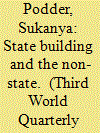

|
|
|
|
|
| Summary/Abstract |
This article unpacks the relationship between state building and the non-state. While accepting both the positive and corrosive characteristics of non-state actors and informal practices of governance, it attempts to (1) advance an argument in favour of mainstreaming ‘non-state’ forms that are positive and useful for state building; and (2) highlight the tensions between the practice of state building and the reality of the non-state. In thinking beyond the state and non-state dichotomy, the article seeks to identify factors that are necessary if state-building programmes are to work in complex environments. Drawing on received wisdom from recent experiences, this conceptual study focuses on important contextual, local, political and legitimacy issues to highlight prominent dilemmas. The conclusion suggests four policy-relevant lessons that reinforce the argument in favour of mainstreaming the non-state agenda into the critical thinking about security and development.
|
|
|
|
|
|
|
|
|
|
|
|
|
|
|
|
| 12 |
ID:
153610
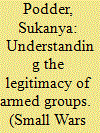

|
|
|
|
|
| Summary/Abstract |
This paper analyses the multiple pathways through which legitimacy of armed groups is constructed in conflict-affected states. It adopts a political sociological approach to the study of armed group legitimacy. Such a strategy assists in identifying whether armed groups enjoy legitimacy in a given empirical context and avoids applying pre-determined normative criteria. The focus is on three types of relationships: civilian communities, the state or regime in power and external actors including regional and international sponsors, to discern which types of legitimacy matter for armed groups in different relationships.
|
|
|
|
|
|
|
|
|
|
|
|
|
|
|
|
|
|
|
|
|